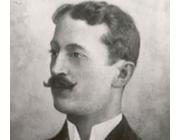
b. 1866, Baia de Criș (Hunedoara) – 1933, Cluj. Lawyer, politician, defender of the memorandists in 1894 and militant for the Great Union of 1 December 1918.
The Amos Frâncu Collection, containing documentary material from the late 19th and 20th centuries, comprises private and political correspondence (correspondence with "Astra"), documents, manuscripts, concepts, declarations, petitions, and other documents relating to the political activity of Amos Frâncu.
Amos Virgiliu Frâncu was born on 28 January 1866, in Baia de Criș, where his father was a proto-fisc comitantes. Left orphaned by his father’s death at the age of 6, the child was raised by the mother, who devoted herself entirely to his education. The family moved to Sibiu, where Amos would attend the state Catholic high school, where he stood out as an eminent student. At the age of 18 he attended the Faculty of Law in Budapest, where he received a doctoral degree "under auspictis regis". After a year in Paris, he returned to Budapest to complete his legal internship. After completing his internship, he returned to the country, to Sibiu, where he would open a lawyer's office.
He eventually settled in Cluj, where he became one of Transylvania’s most important lawyers. Here he stood out, especially, in the trial of the Memorandum (1894), as a defender of the leader of the Romanian National Party, Dr. Ioan Ratiu. Driven by the importance of the historical moment, in 1918 he was at the head of the Romanian national guards. After the Union, he will plead in favour of the inhabitants of Apuseni, in lawsuits related to the ownership of forests. As part of the Brotherhood of the Moths, which he founded in Cluj, he dedicated the last years of his life to the work of helping and emanciating the inhabitants of Țara Moților.
He died on 3 November 1933, poor and without descendants, having never been. The funeral cortege was greeted continuously, all the way to Baia de Criş, with moving expressions of sympathy. Amos Frâncu was buried in the Greek Catholic cemetery in Baia de Criș, close to Horea's gorun and the tomb of Avram Iancu. The entire Romanian press published emotional eulogies.


